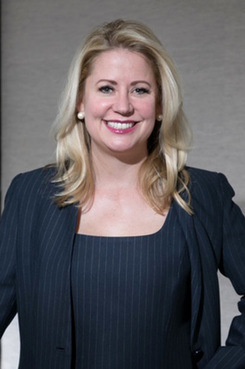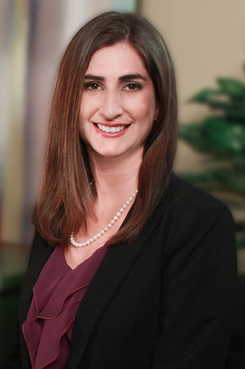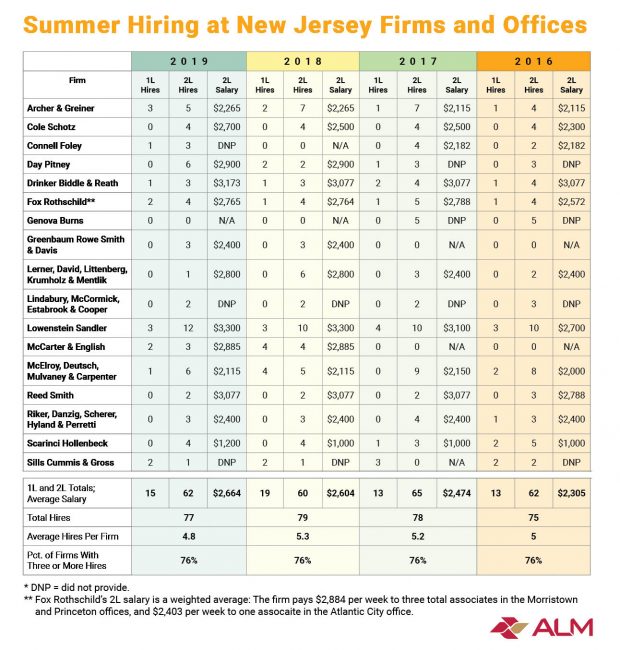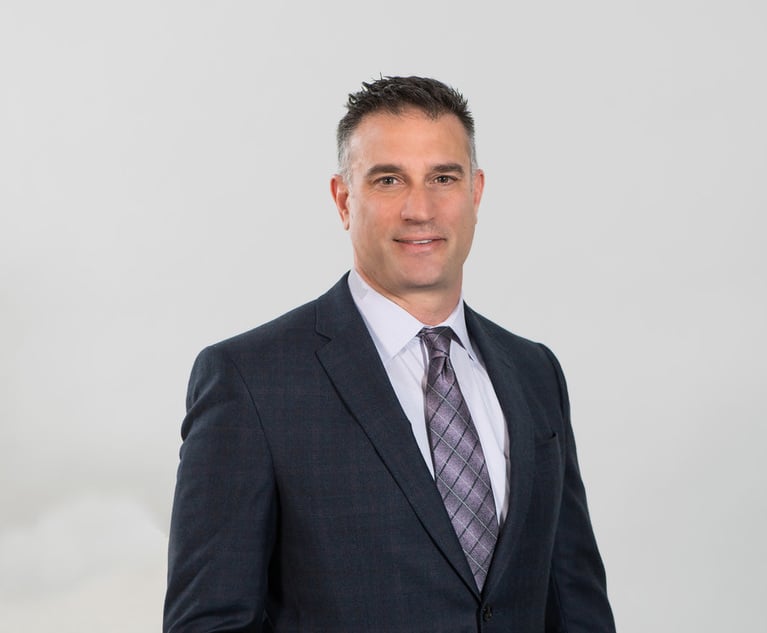NJ Summer Associate Programs Steady in Scale, But Evolution Continues
The hiring of summer associates at New Jersey law firms and offices is steady for 2019. But steadiness doesn't mean stasis, program leaders say.
July 03, 2019 at 12:05 PM
6 minute read
Hiring of summer associates at New Jersey law firms and offices is steady for 2019, with about the same number of hires as last year, to go with a continued rise in average compensation.
But steadiness doesn't mean stasis, program leaders say.
 Nicole Alexander of McElroy, Deutsch, Mulvaney & Carpenter.
Nicole Alexander of McElroy, Deutsch, Mulvaney & Carpenter.At McElroy, Deutsch, Mulvaney & Carpenter, the summer program “has evolved every year,” said Nicole Alexander, the Morristown-based firm's director of professional and business development. “It changes to keep up with the legal environment.”
The Law Journal's survey found that 17 bellwether firms in the state hired 77 summer associates this year: 15 1Ls and 62 2Ls. The total is effectively flat for the past several years. There were 79 total hires last year, 78 in 2017 and 75 in 2016.
Meanwhile, the steady increase in average compensation to 2L summer associates, tied to industrywide growth in first-year associate pay, continued. This year's $2,664 average weekly 2L salary (a weighted average) represents a 2.3% increase from last year's figure ($2,604).
And over the last three years, the average weekly salary for 2Ls has increased 15.6% among the group of 17 New Jersey firms—from $2,305 in 2016.
Firm to firm, changes in pay were relatively few from last year to this year. One exception was Cole Schotz, whose weekly salary for 2Ls increased to $2,700 from $2,500. The change is based on an increase in the firm's first-year associate salary to $145,000 from $135,000 as of September 2018.
Also this year, firms who brought their programs back in 2018 continued with them.
Greenbaum Rowe Smith & Davis, like many other firms in New Jersey and beyond, suspended its program postrecession, when there was increased uncertainty with year-to-year hiring needs. But the firm brought the program back in 2018, hiring three 2Ls at a weekly salary of $2,400, and it has hired the same size class this year.
 Stephanie Reckord of Greenbaum Rowe Smith & Davis. Courtesy photo.
Stephanie Reckord of Greenbaum Rowe Smith & Davis. Courtesy photo.“We wanted this program to really be about hiring,” said Stephanie Reckord, a litigation partner at the Woodbridge-based firm who leads the program and was a summer associate herself in 2005. “We felt at the time it wouldn't be fair [to continue with the program] unless we were really sure of our needs.”
More recently there was an internal push to bring the program back, particularly among former Greenbaum Rowe summers practicing at the firm, and a sense that it was ”important to keep the flow of young lawyers into the firm,” Reckord said. “We just thought it was time.”
So far it has gone well, it seems.
All of Greenbaum Rowe's 2018 summer associates got offers—one starts in September, while the other two are going into judicial clerkships and had their offers deferred, according to Reckord, who noted that the firm's hiring rate for summer associates has been good since before the program was suspended.
Reckord said the program was historically litigation heavy, but in the relaunched program, there is more coordination at the practice group level.
She added, ”We're not the only firm that has managed to figure this out and bring it back, which is exciting.”
Indeed, 2018 also saw McCarter & English relaunch its program after it went on hiatus in 2009. The program returned in a slightly different form, where hiring is decided at the practice group level. The program is back this year: two 1L hires, and three 2L hires at a $2,885 weekly salary.
For other firms, the evaluation continues. Genova Burns of Newark for the second consecutive year is not running a summer program after hosting five 2Ls per year in 2016 and 2017.
Chairman and managing partner Angelo Genova said the firm is “reconsidering the viability of a traditional summer associate program.”
“We have found and are experimenting with hiring from a recurring pool of highly competent candidates sourced from numerous places,” Genova said. “We are focusing on hiring those with experience from judicial clerkships, government service, and alternative tracks. This approach has contributed to the depth and experience of new members to our team who bring to bear external experiences and fresh perspectives to our varied practices.”
Firms that are historically active in hiring summer associates remain so this year.

Lowenstein Sandler's class—three 1Ls and 12 2Ls, with a 2L weekly salary of $3,300—is the largest of the group, as was the case each of the past three years.
Archer & Greiner has eight total hires: three 1Ls and five 2Ls, with a 2L weekly salary of $2,265. The firm had nine hires in 2018 and eight in 2017.
McElroy Deutsch had seven hires. That's two fewer than each of the prior two years, though the firmwide program is about the same size with additional summer hires at the New York office, Alexander said.
What has changed more are the interests of the associates, and how early on they begin considering those interests, Alexander said.
Among candidates, she said, there is “a demand for more professional development” and “a demand for work-life balance, and proof of it.” Candidates want “proof of a robust diversity and inclusion committee,” as well as billable-hour credit for pro bono work, Alexander added.
“It's definitely a different generation. It's a positive thing,” she said, because it encourages the firm to adapt and to reflect on its culture.
The programs, and the evolution, appear primed to continue, as the recruitment process now begins earlier in the year. Alexander and Reckord, as they spoke with the Law Journal, were planning July on-campus interviews for 2020 summer associate candidates.
“The new class is already on the horizon,” Alexander said.
This content has been archived. It is available through our partners, LexisNexis® and Bloomberg Law.
To view this content, please continue to their sites.
Not a Lexis Subscriber?
Subscribe Now
Not a Bloomberg Law Subscriber?
Subscribe Now
NOT FOR REPRINT
© 2025 ALM Global, LLC, All Rights Reserved. Request academic re-use from www.copyright.com. All other uses, submit a request to [email protected]. For more information visit Asset & Logo Licensing.
You Might Like
View All


'A More Nuanced Issue': NJ Supreme Court Considers Appellate Rules for Personal Injury Judgments
5 minute readTrending Stories
- 1'A Death Sentence for TikTok'?: Litigators and Experts Weigh Impact of Potential Ban on Creators and Data Privacy
- 2Bribery Case Against Former Lt. Gov. Brian Benjamin Is Dropped
- 3‘Extremely Disturbing’: AI Firms Face Class Action by ‘Taskers’ Exposed to Traumatic Content
- 4State Appeals Court Revives BraunHagey Lawsuit Alleging $4.2M Unlawful Wire to China
- 5Invoking Trump, AG Bonta Reminds Lawyers of Duties to Noncitizens in Plea Dealing
Who Got The Work
J. Brugh Lower of Gibbons has entered an appearance for industrial equipment supplier Devco Corporation in a pending trademark infringement lawsuit. The suit, accusing the defendant of selling knock-off Graco products, was filed Dec. 18 in New Jersey District Court by Rivkin Radler on behalf of Graco Inc. and Graco Minnesota. The case, assigned to U.S. District Judge Zahid N. Quraishi, is 3:24-cv-11294, Graco Inc. et al v. Devco Corporation.
Who Got The Work
Rebecca Maller-Stein and Kent A. Yalowitz of Arnold & Porter Kaye Scholer have entered their appearances for Hanaco Venture Capital and its executives, Lior Prosor and David Frankel, in a pending securities lawsuit. The action, filed on Dec. 24 in New York Southern District Court by Zell, Aron & Co. on behalf of Goldeneye Advisors, accuses the defendants of negligently and fraudulently managing the plaintiff's $1 million investment. The case, assigned to U.S. District Judge Vernon S. Broderick, is 1:24-cv-09918, Goldeneye Advisors, LLC v. Hanaco Venture Capital, Ltd. et al.
Who Got The Work
Attorneys from A&O Shearman has stepped in as defense counsel for Toronto-Dominion Bank and other defendants in a pending securities class action. The suit, filed Dec. 11 in New York Southern District Court by Bleichmar Fonti & Auld, accuses the defendants of concealing the bank's 'pervasive' deficiencies in regards to its compliance with the Bank Secrecy Act and the quality of its anti-money laundering controls. The case, assigned to U.S. District Judge Arun Subramanian, is 1:24-cv-09445, Gonzalez v. The Toronto-Dominion Bank et al.
Who Got The Work
Crown Castle International, a Pennsylvania company providing shared communications infrastructure, has turned to Luke D. Wolf of Gordon Rees Scully Mansukhani to fend off a pending breach-of-contract lawsuit. The court action, filed Nov. 25 in Michigan Eastern District Court by Hooper Hathaway PC on behalf of The Town Residences LLC, accuses Crown Castle of failing to transfer approximately $30,000 in utility payments from T-Mobile in breach of a roof-top lease and assignment agreement. The case, assigned to U.S. District Judge Susan K. Declercq, is 2:24-cv-13131, The Town Residences LLC v. T-Mobile US, Inc. et al.
Who Got The Work
Wilfred P. Coronato and Daniel M. Schwartz of McCarter & English have stepped in as defense counsel to Electrolux Home Products Inc. in a pending product liability lawsuit. The court action, filed Nov. 26 in New York Eastern District Court by Poulos Lopiccolo PC and Nagel Rice LLP on behalf of David Stern, alleges that the defendant's refrigerators’ drawers and shelving repeatedly break and fall apart within months after purchase. The case, assigned to U.S. District Judge Joan M. Azrack, is 2:24-cv-08204, Stern v. Electrolux Home Products, Inc.
Featured Firms
Law Offices of Gary Martin Hays & Associates, P.C.
(470) 294-1674
Law Offices of Mark E. Salomone
(857) 444-6468
Smith & Hassler
(713) 739-1250







